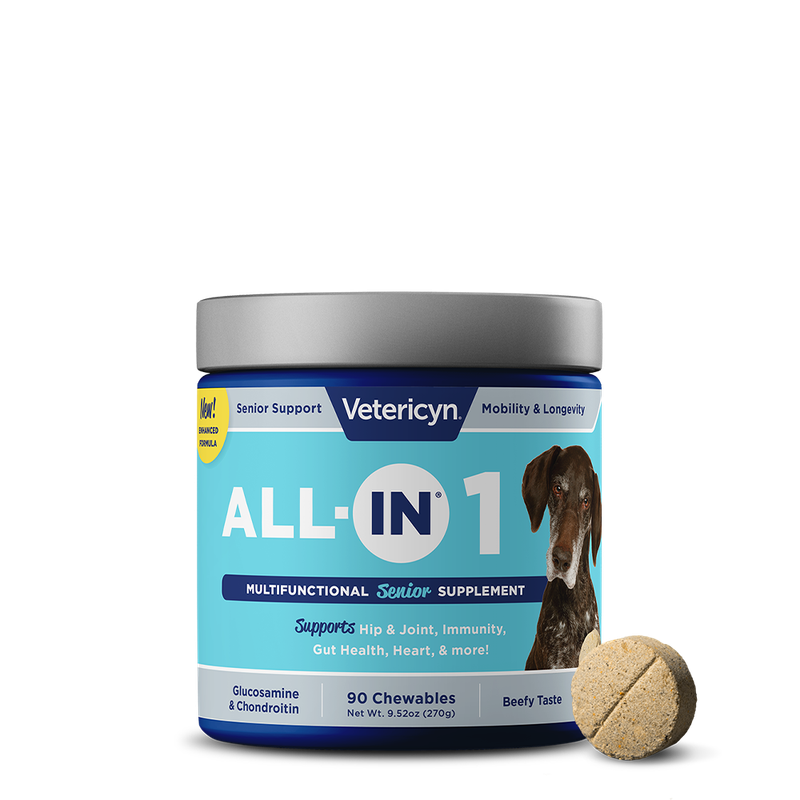Powered by Bestia Europe B.V.
Senior Dog Care: How Multivitamins Can Support Healthy Aging
Aging is a natural part of life, and it happens to our beloved canine companions as well. Watching your energetic pup transition into their golden years is bittersweet, but with the right care, including targeted senior dog vitamins, you can help them enjoy their later years to the fullest.
Why Nutrition is Key for Senior Dogs
Proper nutrition, combined with regular exercise, is essential to support your dog’s aging process. Senior dog vitamins provide a convenient way to ensure your dog’s diet includes the full spectrum of nutrients they need to stay healthy and active. But how do you know if your senior dog’s diet meets their changing needs?
This guide delves into the science of aging in dogs and identifies the specific nutrients that can enhance their overall health. Whether your furry friend is a picky eater or a canned food enthusiast, we’ll show you how to keep them comfortable, active, and happy.
Understanding the Aging Process in Dogs
How fast do dogs age compared to humans? You’ve likely heard that one human year equals seven dog years. While not entirely accurate, dogs do age faster than humans. A two-year-old dog is approximately equivalent to a 10-year-old human child, with aging slowing to about four dog years for every one human year after that. Larger breeds age faster than smaller ones, making nutrition even more critical as they grow older.
As dogs age, visible changes like graying fur and slower mobility occur. However, internal changes, such as decreased immune function, reduced nutrient absorption, and joint issues, are more impactful and often overlooked.
Nutritional Needs for Senior Dogs
While genetics and breed significantly influence aging, proper care and nutrition can mitigate many age-related issues. Advances in veterinary care and tailored diets have increased canine lifespans.
Key Nutrients for Senior Dogs
- Omega-3 Fatty Acids: Found in EPA and DHA, these support joint, digestive, and cognitive health.
- Antioxidants: Vitamins C and E, manganese, selenium, and beta-carotene combat inflammation and free radical damage.
- High-Quality Protein: Essential for maintaining muscle mass without overloading the kidneys.
- Controlled Calories: Preventing weight gain supports heart, bone, and blood sugar health.
Multivitamins: Filling Nutritional Gaps
A multivitamin rich in essential nutrients like vitamins A, B, C, D, and K, alongside minerals such as zinc and CoQ10, boosts your dog’s health.
Benefits of Multivitamins:
- Immune Function: Vitamins A and C strengthen the immune system.
- Cognitive Health: Antioxidants and CoQ10 protect brain function.
- Bone and Joint Health: Vitamins D and K, combined with zinc, maintain bone density and joint flexibility.
Senior dogs often struggle to absorb nutrients from food alone. Supplements like Vetericyn’s ALL-IN ensure your dog gets what they need with a clinically proven protein delivery system for optimal absorption.
Choosing the Right Multivitamin
When selecting a supplement, prioritize:
- Absorbability: Ensure nutrients are bioavailable, as seen in Vetericyn’s ALL-IN formula.
- Age-Specific Formulations: Choose supplements tailored to senior dogs.
- Natural Ingredients: Opt for products derived from high-quality sources like grass-fed meat and fish oil, free from artificial additives.
Pro Tip: Avoid using human supplements for dogs. These often contain harmful ingredients like xylitol or disproportionate vitamin levels that can lead to toxicity.
Support Your Senior Dog With Vetericyn
Thanks to advancements in canine nutrition, more dogs are thriving well into their senior years. Vetericyn’s ALL-IN supplements are designed to meet the unique needs of dogs at every life stage. Packed with patented nutritional complexes and delivered via an advanced protein delivery system, ALL-IN ensures optimal health for your senior dog.
Frequently Asked Questions:
- What vitamins are best for senior dogs? Key vitamins include A, B complex, C, D, and K.
- How do I choose the right multivitamin for my dog? Look for absorbability, natural ingredients, and age-specific formulations.
- Why is controlled calorie intake important? Maintaining a healthy weight reduces strain on joints and supports heart health.
Invest in your dog’s health and happiness by choosing Vetericyn’s ALL-IN today—because your loyal companion deserves the best care throughout their golden years.
Sources:
- VCA Animal Hospitals. How old is old? Comparing dog age to human age. https://vcahospitals.com/know-your-pet/how-old-is-old-comparing-dog-age-to-human-age
- American Veterinary Medical Association. Caring for senior cats and dogs. https://www.avma.org/resources-tools/pet-owners/petcare/senior-pets
- Animals. Healthy aging is associated with preserved or enhanced nutrient and mineral apparent digestibility in dogs and cats fed commercially relevant extruded diets. https://www.ncbi.nlm.nih.gov/pmc/articles/PMC8300295/
- VCA Animal Hospitals. Antioxidants. https://vcahospitals.com/know-your-pet/antioxidants
- VCA Animal Hospitals. Feeding mature and senior dogs. https://vcahospitals.com/know-your-pet/feeding-mature-and-senior-dogs
- Journal of Veterinary Internal Medicine. Association between life span and body condition in neutered client-owned dogs. https://onlinelibrary.wiley.com/doi/full/10.1111/jvim.15367
- Antioxidants. Effects of coenzyme Q10 supplementation on oxidative stress markers, inflammatory markers, lymphocyte subpopulations, and clinical status in dogs with myxomatous mitral valve disease. https://www.ncbi.nlm.nih.gov/pmc/articles/PMC9394267/
- Association for the Prevention of Cruelty to Animals. Which supplements and vitamins are dangerous for pets? https://www.aspca.org/news/which-supplements-and-vitamins-are-dangerous-pets
- Animals. Zinc in dog nutrition, health and disease: a review. https://www.ncbi.nlm.nih.gov/pmc/articles/PMC8066201/
- Journal of the American Veterinary Medicine Association. Timely topics in nutrition: An overview of fatty acids in companion animal medicine. https://pubmed.ncbi.nlm.nih.gov/25970216/
Refine by

Vetericyn ALL-IN Senior Dog Supplements
Vetericyn ALL-IN Senior Dog Supplements
Mobility and rejuvenation. A formula protected by 8 patents. Proven absorption of the ingredients.
€28,88
Display prices in:EUR


